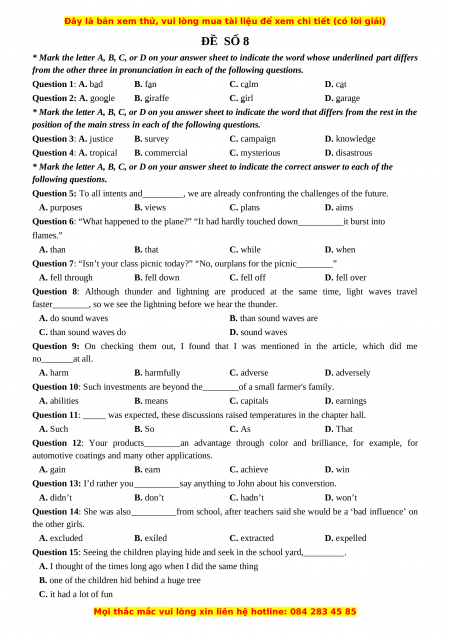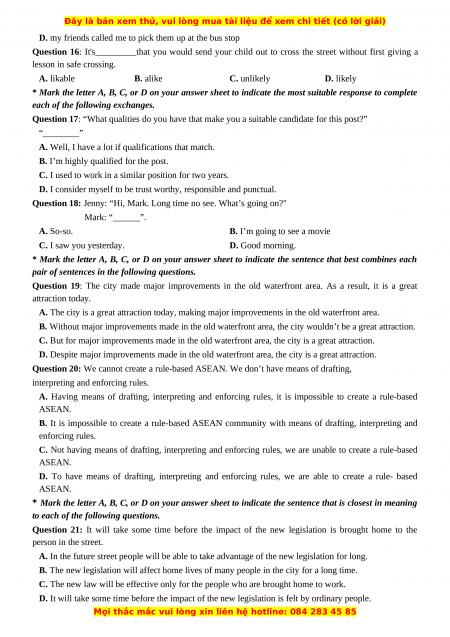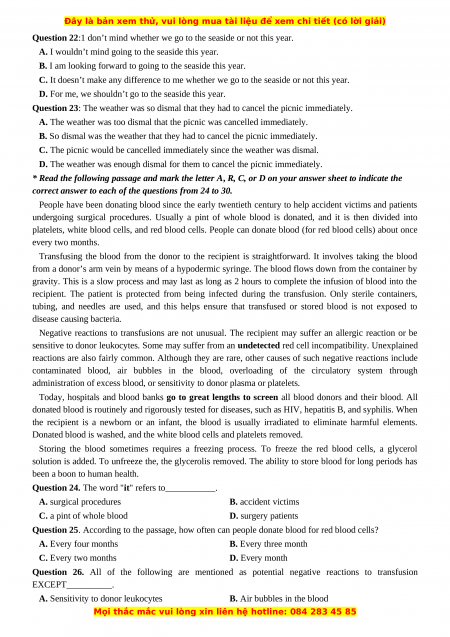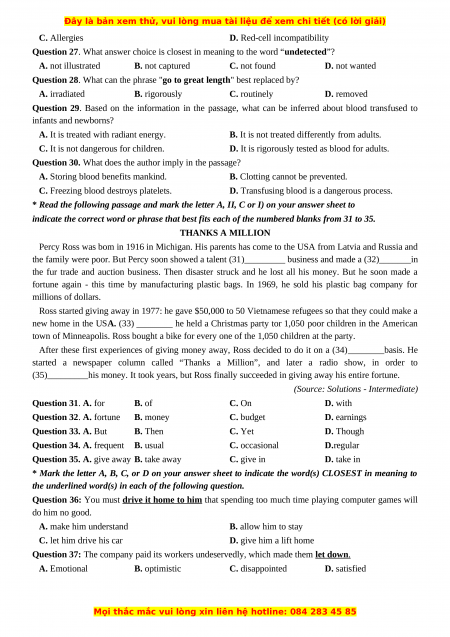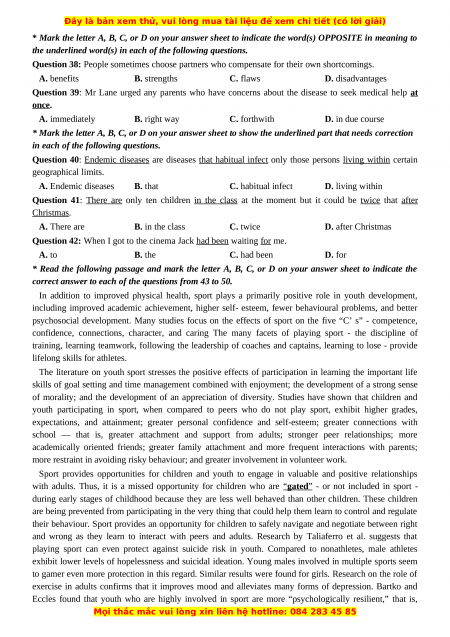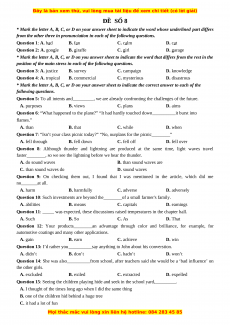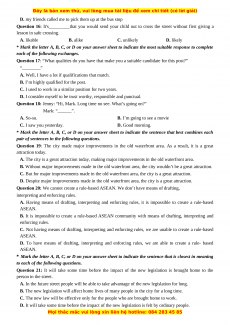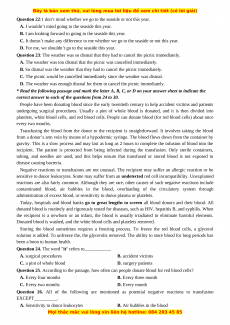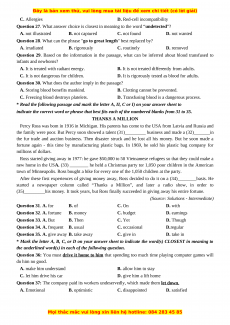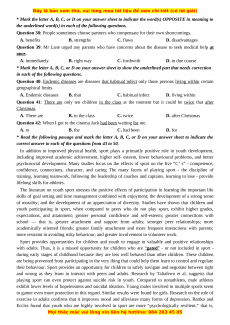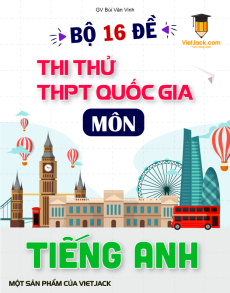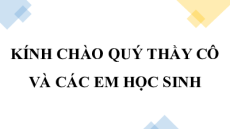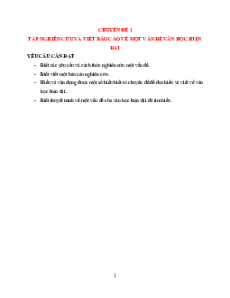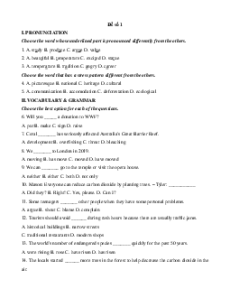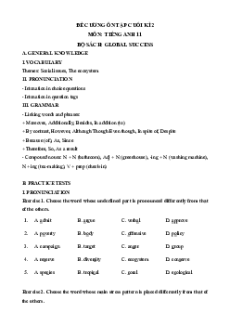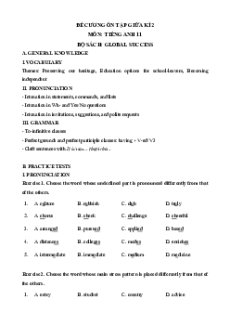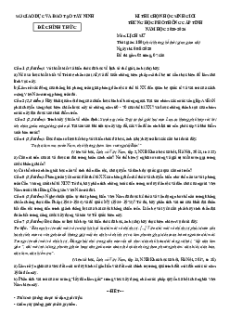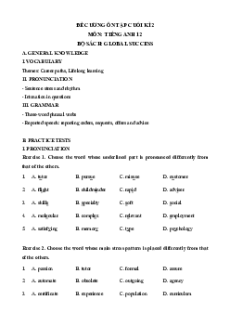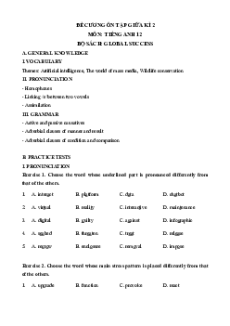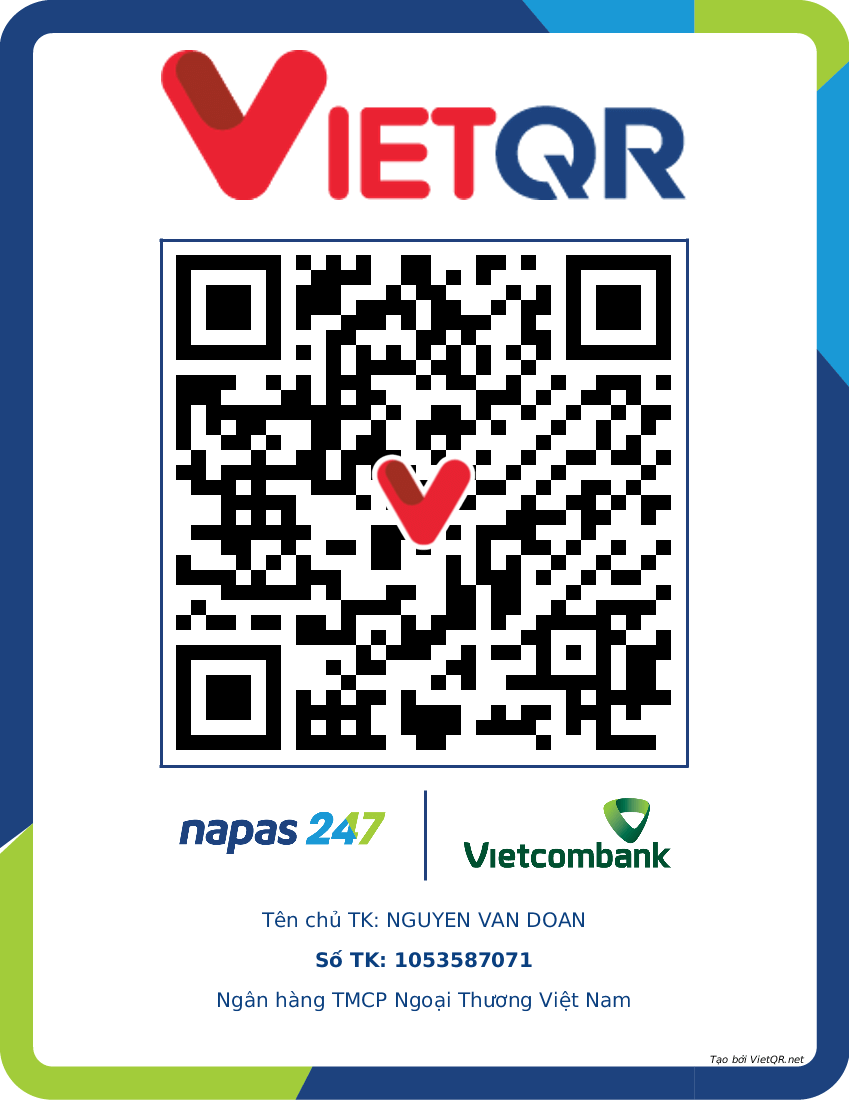ĐỀ SỐ 8
* Mark the letter A, B, C, or D on your answer sheet to indicate the word whose underlined part differs
from the other three in pronunciation in each of the following questions.
Question 1: A. bad B. fan C. calm D. cat
Question 2: A. google B. giraffe C. girl D. garage
* Mark the letter A, B, C, or D on you answer sheet to indicate the word that differs from the rest in the
position of the main stress in each of the following questions.
Question 3: A. justice B. survey C. campaign D. knowledge
Question 4: A. tropical B. commercial C. mysterious D. disastrous
* Mark the letter A, B, C, or D on your answer sheet to indicate the correct answer to each of the following questions.
Question 5: To all intents and_________, we are already confronting the challenges of the future. A. purposes B. views C. plans D. aims
Question 6: “What happened to the plane?” “It had hardly touched down__________it burst into flames.” A. than B. that C. while D. when
Question 7: “Isn’t your class picnic today?” “No, ourplans for the picnic________” A. fell through B. fell down C. fell off D. fell over
Question 8: Although thunder and lightning are produced at the same time, light waves travel
faster________, so we see the lightning before we hear the thunder. A. do sound waves B. than sound waves are C. than sound waves do D. sound waves
Question 9: On checking them out, I found that I was mentioned in the article, which did me no_______at all. A. harm B. harmfully C. adverse D. adversely
Question 10: Such investments are beyond the________of a small farmer's family. A. abilities B. means C. capitals D. earnings
Question 11: _____ was expected, these discussions raised temperatures in the chapter hall. A. Such B. So C. As D. That
Question 12: Your products________an advantage through color and brilliance, for example, for
automotive coatings and many other applications. A. gain B. earn C. achieve D. win
Question 13: I’d rather you__________say anything to John about his converstion. A. didn’t B. don’t C. hadn’t D. won’t
Question 14: She was also__________from school, after teachers said she would be a ‘bad influence’ on the other girls. A. excluded B. exiled C. extracted D. expelled
Question 15: Seeing the children playing hide and seek in the school yard,_________.
A. I thought of the times long ago when I did the same thing
B. one of the children hid behind a huge tree C. it had a lot of fun
D. my friends called me to pick them up at the bus stop
Question 16: It's_________that you would send your child out to cross the street without first giving a lesson in safe crossing. A. likable B. alike C. unlikely D. likely
* Mark the letter A, B, C, or D on your answer sheet to indicate the most suitable response to complete
each of the following exchanges.
Question 17: “What qualities do you have that make you a suitable candidate for this post?” “________”
A. Well, I have a lot if qualifications that match.
B. I’m highly qualified for the post.
C. I used to work in a similar position for two years.
D. I consider myself to be trust worthy, responsible and punctual.
Question 18: Jenny: “Hi, Mark. Long time no see. What’s going on?" Mark: “______”. A. So-so.
B. I’m going to see a movie C. I saw you yesterday. D. Good morning.
* Mark the letter A, B, C, or D on your answer sheet to indicate the sentence that best combines each
pair of sentences in the following questions.
Question 19: The city made major improvements in the old waterfront area. As a result, it is a great attraction today.
A. The city is a great attraction today, making major improvements in the old waterfront area.
B. Without major improvements made in the old waterfront area, the city wouldn’t be a great attraction.
C. But for major improvements made in the old waterfront area, the city is a great attraction.
D. Despite major improvements made in the old waterfront area, the city is a great attraction.
Question 20: We cannot create a rule-based ASEAN. We don’t have means of drafting,
interpreting and enforcing rules.
A. Having means of drafting, interpreting and enforcing rules, it is impossible to create a rule-based ASEAN.
B. It is impossible to create a rule-based ASEAN community with means of drafting, interpreting and enforcing rules.
C. Not having means of drafting, interpreting and enforcing rules, we are unable to create a rule-based ASEAN.
D. To have means of drafting, interpreting and enforcing rules, we are able to create a rule- based ASEAN.
* Mark the letter A, B, C, or D on your answer sheet to indicate the sentence that is closest in meaning
to each of the following questions.
Question 21: It will take some time before the impact of the new legislation is brought home to the person in the street.
A. In the future street people will be able to take advantage of the new legislation for long.
B. The new legislation will affect home lives of many people in the city for a long time.
C. The new law will be effective only for the people who are brought home to work.
D. It will take some time before the impact of the new legislation is felt by ordinary people.
Question 22:1 don’t mind whether we go to the seaside or not this year.
A. I wouldn’t mind going to the seaside this year.
B. I am looking forward to going to the seaside this year.
C. It doesn’t make any difference to me whether we go to the seaside or not this year.
D. For me, we shouldn’t go to the seaside this year.
Question 23: The weather was so dismal that they had to cancel the picnic immediately.
A. The weather was too dismal that the picnic was cancelled immediately.
B. So dismal was the weather that they had to cancel the picnic immediately.
C. The picnic would be cancelled immediately since the weather was dismal.
D. The weather was enough dismal for them to cancel the picnic immediately.
* Read the following passage and mark the letter A, R, C, or D on your answer sheet to indicate the
correct answer to each of the questions from 24 to 30.
People have been donating blood since the early twentieth century to help accident victims and patients
undergoing surgical procedures. Usually a pint of whole blood is donated, and it is then divided into
platelets, white blood cells, and red blood cells. People can donate blood (for red blood cells) about once every two months.
Transfusing the blood from the donor to the recipient is straightforward. It involves taking the blood
from a donor’s arm vein by means of a hypodermic syringe. The blood flows down from the container by
gravity. This is a slow process and may last as long as 2 hours to complete the infusion of blood into the
recipient. The patient is protected from being infected during the transfusion. Only sterile containers,
tubing, and needles are used, and this helps ensure that transfused or stored blood is not exposed to disease causing bacteria.
Negative reactions to transfusions are not unusual. The recipient may suffer an allergic reaction or be
sensitive to donor leukocytes. Some may suffer from an undetected red cell incompatibility. Unexplained
reactions are also fairly common. Although they are rare, other causes of such negative reactions include
contaminated blood, air bubbles in the blood, overloading of the circulatory system through
administration of excess blood, or sensitivity to donor plasma or platelets.
Today, hospitals and blood banks go to great lengths to screen all blood donors and their blood. All
donated blood is routinely and rigorously tested for diseases, such as HIV, hepatitis B, and syphilis. When
the recipient is a newborn or an infant, the blood is usually irradiated to eliminate harmful elements.
Donated blood is washed, and the white blood cells and platelets removed.
Storing the blood sometimes requires a freezing process. To freeze the red blood cells, a glycerol
solution is added. To unfreeze the, the glycerolis removed. The ability to store blood for long periods has been a boon to human health.
Question 24. The word "it" refers to___________. A. surgical procedures B. accident victims
C. a pint of whole blood D. surgery patients
Question 25. According to the passage, how often can people donate blood for red blood cells? A. Every four months B. Every three month C. Every two months D. Every month
Question 26. All of the following are mentioned as potential negative reactions to transfusion EXCEPT__________.
A. Sensitivity to donor leukocytes
B. Air bubbles in the blood
C. Allergies
D. Red-cell incompatibility
Question 27. What answer choice is closest in meaning to the word “undetected”? A. not illustrated B. not captured C. not found D. not wanted
Question 28. What can the phrase "go to great length" best replaced by? A. irradiated B. rigorously C. routinely D. removed
Question 29. Based on the information in the passage, what can be inferred about blood transfused to infants and newborns?
A. It is treated with radiant energy.
B. It is not treated differently from adults.
C. It is not dangerous for children.
D. It is rigorously tested as blood for adults.
Question 30. What does the author imply in the passage?
A. Storing blood benefits mankind.
B. Clotting cannot be prevented.
C. Freezing blood destroys platelets.
D. Transfusing blood is a dangerous process.
* Read the following passage and mark the letter A, II, C or I) on your answer sheet to
indicate the correct word or phrase that best fits each of the numbered blanks from 31 to 35. THANKS A MILLION
Percy Ross was bom in 1916 in Michigan. His parents has come to the USA from Latvia and Russia and
the family were poor. But Percy soon showed a talent (31)_________ business and made a (32)_______in
the fur trade and auction business. Then disaster struck and he lost all his money. But he soon made a
fortune again - this time by manufacturing plastic bags. In 1969, he sold his plastic bag company for millions of dollars.
Ross started giving away in 1977: he gave $50,000 to 50 Vietnamese refugees so that they could make a
new home in the USA. (33) ________ he held a Christmas party tor 1,050 poor children in the American
town of Minneapolis. Ross bought a bike for every one of the 1,050 children at the party.
After these first experiences of giving money away, Ross decided to do it on a (34)________basis. He
started a newspaper column called “Thanks a Million”, and later a radio show, in order to
(35)_________his money. It took years, but Ross finally succeeded in giving away his entire fortune.
(Source: Solutions - Intermediate)
Question 31. A. for B. of C. On D. with
Question 32. A. fortune B. money C. budget D. earnings
Question 33. A. But B. Then C. Yet D. Though
Question 34. A. frequent B. usual C. occasional D.regular
Question 35. A. give away B. take away C. give in D. take in
* Mark the letter A, B, C, or D on your answer sheet to indicate the word(s) CLOSEST in meaning to
the underlined word(s) in each of the following question.
Question 36: You must drive it home to him that spending too much time playing computer games will do him no good. A. make him understand B. allow him to stay
C. let him drive his car D. give him a lift home
Question 37: The company paid its workers undeservedly, which made them l et down . A. Emotional B. optimistic C. disappointed D. satisfied
Đề thi thử THPT Quốc Gia môn Tiếng Anh có đáp án ( đề 8 ) - thầy Bùi Văn Vinh
403
202 lượt tải
MUA NGAY ĐỂ XEM TOÀN BỘ TÀI LIỆU
CÁCH MUA:
- B1: Gửi phí vào TK:
1133836868- CT TNHH DAU TU VA DV GD VIETJACK - Ngân hàng MB (QR) - B2: Nhắn tin tới Zalo VietJack Official ( nhấn vào đây ) để xác nhận thanh toán và tải tài liệu - giáo án
Liên hệ ngay Hotline hỗ trợ: 084 283 45 85
Đề thi được cập nhật liên tục trong gói này từ nay đến hết tháng 6/2023. Chúng tôi đảm bảo đủ số lượng đề đã cam kết hoặc có thể nhiều hơn, tất cả có BẢN WORD, LỜI GIẢI CHI TIẾT và tải về dễ dàng.
Để tải tài liệu gốc về máy bạn click vào nút Tải Xuống ở trên!
Thuộc bộ (mua theo bộ để tiết kiệm hơn):
- Các đề thi được chọn lọc từ các trường Chuyên và Sở Giáo dục cả nước. Đảm bảo chất lượng, cấu trúc bám sát nhất với kì thì TN THPT 2023 môn Tiếng Anh.
- File word có lời giải chi tiết 100%.
- Đề thi mới sẽ được cập nhật tại gói này đến sát kì thi TN THPT 2023
- Mua trọn bộ sẽ tiết kiệm hơn tải lẻ 50%.
Đánh giá
4.6 / 5(403 )5
4
3
2
1
Trọng Bình
Tài liệu hay
Giúp ích cho tôi rất nhiều
Duy Trần
Tài liệu chuẩn
Rất thích tài liệu bên VJ soạn (bám sát chương trình dạy)
TÀI LIỆU BỘ BÁN CHẠY MÔN Tiếng Anh
Xem thêmTÀI LIỆU BỘ BÁN CHẠY Lớp 12
Xem thêmTài liệu bộ mới nhất

Đây là bản xem thử, vui lòng mua tài liệu để xem chi tiết (có lời giải)
ĐỀ SỐ 8
* Mark the letter A, B, C, or D on your answer sheet to indicate the word whose underlined part differs
from the other three in pronunciation in each of the following questions.
Question 1: A. bad B. fan C. calm D. cat
Question 2: A. google B. giraffe C. girl D. garage
* Mark the letter A, B, C, or D on you answer sheet to indicate the word that differs from the rest in the
position of the main stress in each of the following questions.
Question 3: A. justice B. survey C. campaign D. knowledge
Question 4: A. tropical B. commercial C. mysterious D. disastrous
* Mark the letter A, B, C, or D on your answer sheet to indicate the correct answer to each of the
following questions.
Question 5: To all intents and_________, we are already confronting the challenges of the future.
A. purposes B. views C. plans D. aims
Question 6: “What happened to the plane?” “It had hardly touched down__________it burst into
flames.”
A. than B. that C. while D. when
Question 7: “Isn’t your class picnic today?” “No, ourplans for the picnic________”
A. fell through B. fell down C. fell off D. fell over
Question 8: Although thunder and lightning are produced at the same time, light waves travel
faster________, so we see the lightning before we hear the thunder.
A. do sound waves B. than sound waves are
C. than sound waves do D. sound waves
Question 9: On checking them out, I found that I was mentioned in the article, which did me
no_______at all.
A. harm B. harmfully C. adverse D. adversely
Question 10: Such investments are beyond the________of a small farmer's family.
A. abilities B. means C. capitals D. earnings
Question 11: _____ was expected, these discussions raised temperatures in the chapter hall.
A. Such B. So C. As D. That
Question 12: Your products________an advantage through color and brilliance, for example, for
automotive coatings and many other applications.
A. gain B. earn C. achieve D. win
Question 13: I’d rather you__________say anything to John about his converstion.
A. didn’t B. don’t C. hadn’t D. won’t
Question 14: She was also__________from school, after teachers said she would be a ‘bad influence’ on
the other girls.
A. excluded B. exiled C. extracted D. expelled
Question 15: Seeing the children playing hide and seek in the school yard,_________.
A. I thought of the times long ago when I did the same thing
B. one of the children hid behind a huge tree
C. it had a lot of fun
Mọi thắc mắc vui lòng xin liên hệ hotline: 084 283 45 85

Đây là bản xem thử, vui lòng mua tài liệu để xem chi tiết (có lời giải)
D. my friends called me to pick them up at the bus stop
Question 16: It's_________that you would send your child out to cross the street without first giving a
lesson in safe crossing.
A. likable B. alike C. unlikely D. likely
* Mark the letter A, B, C, or D on your answer sheet to indicate the most suitable response to complete
each of the following exchanges.
Question 17: “What qualities do you have that make you a suitable candidate for this post?”
“________”
A. Well, I have a lot if qualifications that match.
B. I’m highly qualified for the post.
C. I used to work in a similar position for two years.
D. I consider myself to be trust worthy, responsible and punctual.
Question 18: Jenny: “Hi, Mark. Long time no see. What’s going on?"
Mark: “______”.
A. So-so. B. I’m going to see a movie
C. I saw you yesterday. D. Good morning.
* Mark the letter A, B, C, or D on your answer sheet to indicate the sentence that best combines each
pair of sentences in the following questions.
Question 19: The city made major improvements in the old waterfront area. As a result, it is a great
attraction today.
A. The city is a great attraction today, making major improvements in the old waterfront area.
B. Without major improvements made in the old waterfront area, the city wouldn’t be a great attraction.
C. But for major improvements made in the old waterfront area, the city is a great attraction.
D. Despite major improvements made in the old waterfront area, the city is a great attraction.
Question 20: We cannot create a rule-based ASEAN. We don’t have means of drafting,
interpreting and enforcing rules.
A. Having means of drafting, interpreting and enforcing rules, it is impossible to create a rule-based
ASEAN.
B. It is impossible to create a rule-based ASEAN community with means of drafting, interpreting and
enforcing rules.
C. Not having means of drafting, interpreting and enforcing rules, we are unable to create a rule-based
ASEAN.
D. To have means of drafting, interpreting and enforcing rules, we are able to create a rule- based
ASEAN.
* Mark the letter A, B, C, or D on your answer sheet to indicate the sentence that is closest in meaning
to each of the following questions.
Question 21: It will take some time before the impact of the new legislation is brought home to the
person in the street.
A. In the future street people will be able to take advantage of the new legislation for long.
B. The new legislation will affect home lives of many people in the city for a long time.
C. The new law will be effective only for the people who are brought home to work.
D. It will take some time before the impact of the new legislation is felt by ordinary people.
Mọi thắc mắc vui lòng xin liên hệ hotline: 084 283 45 85

Đây là bản xem thử, vui lòng mua tài liệu để xem chi tiết (có lời giải)
Question 22:1 don’t mind whether we go to the seaside or not this year.
A. I wouldn’t mind going to the seaside this year.
B. I am looking forward to going to the seaside this year.
C. It doesn’t make any difference to me whether we go to the seaside or not this year.
D. For me, we shouldn’t go to the seaside this year.
Question 23: The weather was so dismal that they had to cancel the picnic immediately.
A. The weather was too dismal that the picnic was cancelled immediately.
B. So dismal was the weather that they had to cancel the picnic immediately.
C. The picnic would be cancelled immediately since the weather was dismal.
D. The weather was enough dismal for them to cancel the picnic immediately.
* Read the following passage and mark the letter A, R, C, or D on your answer sheet to indicate the
correct answer to each of the questions from 24 to 30.
People have been donating blood since the early twentieth century to help accident victims and patients
undergoing surgical procedures. Usually a pint of whole blood is donated, and it is then divided into
platelets, white blood cells, and red blood cells. People can donate blood (for red blood cells) about once
every two months.
Transfusing the blood from the donor to the recipient is straightforward. It involves taking the blood
from a donor’s arm vein by means of a hypodermic syringe. The blood flows down from the container by
gravity. This is a slow process and may last as long as 2 hours to complete the infusion of blood into the
recipient. The patient is protected from being infected during the transfusion. Only sterile containers,
tubing, and needles are used, and this helps ensure that transfused or stored blood is not exposed to
disease causing bacteria.
Negative reactions to transfusions are not unusual. The recipient may suffer an allergic reaction or be
sensitive to donor leukocytes. Some may suffer from an undetected red cell incompatibility. Unexplained
reactions are also fairly common. Although they are rare, other causes of such negative reactions include
contaminated blood, air bubbles in the blood, overloading of the circulatory system through
administration of excess blood, or sensitivity to donor plasma or platelets.
Today, hospitals and blood banks go to great lengths to screen all blood donors and their blood. All
donated blood is routinely and rigorously tested for diseases, such as HIV, hepatitis B, and syphilis. When
the recipient is a newborn or an infant, the blood is usually irradiated to eliminate harmful elements.
Donated blood is washed, and the white blood cells and platelets removed.
Storing the blood sometimes requires a freezing process. To freeze the red blood cells, a glycerol
solution is added. To unfreeze the, the glycerolis removed. The ability to store blood for long periods has
been a boon to human health.
Question 24. The word "it" refers to___________.
A. surgical procedures B. accident victims
C. a pint of whole blood D. surgery patients
Question 25. According to the passage, how often can people donate blood for red blood cells?
A. Every four months B. Every three month
C. Every two months D. Every month
Question 26. All of the following are mentioned as potential negative reactions to transfusion
EXCEPT__________.
A. Sensitivity to donor leukocytes B. Air bubbles in the blood
Mọi thắc mắc vui lòng xin liên hệ hotline: 084 283 45 85

Đây là bản xem thử, vui lòng mua tài liệu để xem chi tiết (có lời giải)
C. Allergies D. Red-cell incompatibility
Question 27. What answer choice is closest in meaning to the word “undetected”?
A. not illustrated B. not captured C. not found D. not wanted
Question 28. What can the phrase "go to great length" best replaced by?
A. irradiated B. rigorously C. routinely D. removed
Question 29. Based on the information in the passage, what can be inferred about blood transfused to
infants and newborns?
A. It is treated with radiant energy. B. It is not treated differently from adults.
C. It is not dangerous for children. D. It is rigorously tested as blood for adults.
Question 30. What does the author imply in the passage?
A. Storing blood benefits mankind. B. Clotting cannot be prevented.
C. Freezing blood destroys platelets. D. Transfusing blood is a dangerous process.
* Read the following passage and mark the letter A, II, C or I) on your answer sheet to
indicate the correct word or phrase that best fits each of the numbered blanks from 31 to 35.
THANKS A MILLION
Percy Ross was bom in 1916 in Michigan. His parents has come to the USA from Latvia and Russia and
the family were poor. But Percy soon showed a talent (31)_________ business and made a (32)_______in
the fur trade and auction business. Then disaster struck and he lost all his money. But he soon made a
fortune again - this time by manufacturing plastic bags. In 1969, he sold his plastic bag company for
millions of dollars.
Ross started giving away in 1977: he gave $50,000 to 50 Vietnamese refugees so that they could make a
new home in the USA. (33) ________ he held a Christmas party tor 1,050 poor children in the American
town of Minneapolis. Ross bought a bike for every one of the 1,050 children at the party.
After these first experiences of giving money away, Ross decided to do it on a (34)________basis. He
started a newspaper column called “Thanks a Million”, and later a radio show, in order to
(35)_________his money. It took years, but Ross finally succeeded in giving away his entire fortune.
(Source: Solutions - Intermediate)
Question 31. A. for B. of C. On D. with
Question 32. A. fortune B. money C. budget D. earnings
Question 33. A. But B. Then C. Yet D. Though
Question 34. A. frequent B. usual C. occasional D.regular
Question 35. A. give away B. take away C. give in D. take in
* Mark the letter A, B, C, or D on your answer sheet to indicate the word(s) CLOSEST in meaning to
the underlined word(s) in each of the following question.
Question 36: You must drive it home to him that spending too much time playing computer games will
do him no good.
A. make him understand B. allow him to stay
C. let him drive his car D. give him a lift home
Question 37: The company paid its workers undeservedly, which made them let down .
A. Emotional B. optimistic C. disappointed D. satisfied
Mọi thắc mắc vui lòng xin liên hệ hotline: 084 283 45 85

Đây là bản xem thử, vui lòng mua tài liệu để xem chi tiết (có lời giải)
* Mark the letter A, B, C, or D on your answer sheet to indicate the word(s) OPPOSITE in meaning to
the underlined word(s) in each of the following questions.
Question 38: People sometimes choose partners who compensate for their own shortcomings.
A. benefits B. strengths C. flaws D. disadvantages
Question 39: Mr Lane urged any parents who have concerns about the disease to seek medical help at
once.
A. immediately B. right way C. forthwith D. in due course
* Mark the letter A, B, C, or D on your answer sheet to show the underlined part that needs correction
in each of the following questions.
Question 40: Endemic diseases are diseases that habitual infect only those persons living within certain
geographical limits.
A. Endemic diseases B. that C. habitual infect D. living within
Question 41: There are only ten children in the class at the moment but it could be twice that after
Christmas.
A. There are B. in the class C. twice D. after Christmas
Question 42: When I got to the cinema Jack had been waiting for me.
A. to B. the C. had been D. for
* Read the following passage and mark the letter A, B, C, or D on your answer sheet to indicate the
correct answer to each of the questions from 43 to 50.
In addition to improved physical health, sport plays a primarily positive role in youth development,
including improved academic achievement, higher self- esteem, fewer behavioural problems, and better
psychosocial development. Many studies focus on the effects of sport on the five “C’ s” - competence,
confidence, connections, character, and caring The many facets of playing sport - the discipline of
training, learning teamwork, following the leadership of coaches and captains, learning to lose - provide
lifelong skills for athletes.
The literature on youth sport stresses the positive effects of participation in learning the important life
skills of goal setting and time management combined with enjoyment; the development of a strong sense
of morality; and the development of an appreciation of diversity. Studies have shown that children and
youth participating in sport, when compared to peers who do not play sport, exhibit higher grades,
expectations, and attainment; greater personal confidence and self-esteem; greater connections with
school — that is, greater attachment and support from adults; stronger peer relationships; more
academically oriented friends; greater family attachment and more frequent interactions with parents;
more restraint in avoiding risky behaviour; and greater involvement in volunteer work.
Sport provides opportunities for children and youth to engage in valuable and positive relationships
with adults. Thus, it is a missed opportunity for children who are “ gated ” - or not included in sport -
during early stages of childhood because they are less well behaved than other children. These children
are being prevented from participating in the very thing that could help them learn to control and regulate
their behaviour. Sport provides an opportunity for children to safely navigate and negotiate between right
and wrong as they learn to interact with peers and adults. Research by Taliaferro et al. suggests that
playing sport can even protect against suicide risk in youth. Compared to nonathletes, male athletes
exhibit lower levels of hopelessness and suicidal ideation. Young males involved in multiple sports seem
to gamer even more protection in this regard. Similar results were found for girls. Research on the role of
exercise in adults confirms that it improves mood and alleviates many forms of depression. Bartko and
Eccles found that youth who are highly involved in sport are more “psychologically resilient,” that is,
Mọi thắc mắc vui lòng xin liên hệ hotline: 084 283 45 85
